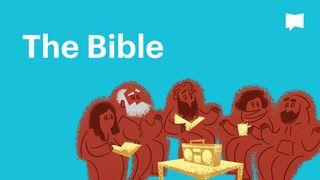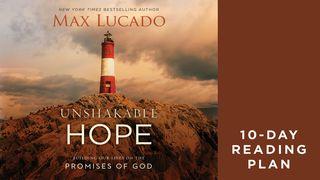The Bible with Nicky and Pippa Gumbel, Classic Version, 2017Sample

Winning the Spiritual Battle
The tragic image is unforgettable. Like so many people, I wept as I saw the picture of 3-year-old Aylan Kurdi’s little body washed up on the shoreline in Turkey. He had drowned, together with his brother and mother, as his family fled the war in Syria.
One of the biggest causes of the current European refugee crisis is warfare. Over 200,000 people have been killed in the civil war in Syria over the last five years. In Iraq, Daesh have murdered thousands of innocent people (many of them Christians) and displaced tens of thousands of people (again, many of them Christians).
These atrocities are extreme and horrific instances of a violence that has always taken place at every level of society. ‘Brother fight brother, neighbour fight neighbour, city fight city, kingdom fight kingdom – anarchy and chaos and killing!’ (Isaiah 19:2, MSG).
Virtually every day in the media we see the horrors of warfare. We live in a world that is constantly developing even more terrible weapons of physical warfare. These weapons have the power to maim, kill and destroy. But this warfare is not purely physical. The issues that give rise to it, as many in both politics and the media acknowledge, are profoundly moral and spiritual.
Just as physical warfare is a serious global issue, so, according to the apostle Paul, is spiritual warfare (see Ephesians 6:10–20). This is unseen, but it is just as real. The great Welsh preacher, Dr Martin Lloyd Jones, once said, ‘There is no grosser or greater misrepresentation of the Christian message than that which depicts it as offering a life of ease with no battle and struggle at all... sooner or later every believer discovers that the Christian life is a battleground, not a playground.’
In this battle we are called not to be overcome by evil, but to overcome evil with good (Romans 12:21). We are given the weapons with which to win the battle. Paul writes, ‘We do not wage war as the world does. The weapons we fight with are not the weapons of the world. On the contrary, they have divine power to demolish strongholds’ (2 Corinthians 10:3b–4).
What are these weapons? How do you use them?
Psalm 106:16-31
1. The weapon of prayer
The psalmist recalls the leadership and ministry of Moses. Some chose to envy God’s powerful use of Moses and Aaron: ‘In the camp they grew envious of Moses and of Aaron’ (v.16).
Moses’ response was not to seek revenge. Rather, it was to pray for them. He ‘stood in the breach’ before God (v.23), and interceded for them. In the account of Exodus 32:11–14 we see how, by the power of prayer, it is possible to change the course of history.
Phinehas was another who ‘intervened’ on behalf of the people (see Numbers 25). His intervention must have stemmed from his faith. We are told here that, as with Abraham, it was credited to him as righteousness (Psalm 106:31).
The powerful weapon of prayer is available to you. Pray for your family, friends and all those who the Spirit inspires you to pray for. ‘Stand in the breach’ and intercede on behalf of others. As Jeremy Jennings says at the end of every prayer meeting at HTB, ‘Thank you for praying. You have made a difference.’
Lord, thank you for the power of intercessory prayer. Today, I want to stand in the breach and intercede for…
2 Corinthians 10:1-18
2. The weapon of the gospel
Your mind is a battlefield. Your thoughts are at the root of your words and actions. The devil seeks to set up strongholds in your mind. Paul knew that at the heart of spiritual battle is the battle for the mind. There is a sense in which each of us is involved in an individual spiritual battle in our own mind. This is a daily battle to resist the temptation of wrong thoughts and take captive every thought to obey Christ (v.5).
Although Paul alludes to the individual battle of the mind here, he was primarily thinking of something a little different. There was a cultural battle going on: a battle of ideas, philosophies and worldviews. Paul actively engaged in this battle to take on those competing ideas, philosophies and worldviews and to take them captive in obedience to Christ.
Paul wrote, ‘The world is unprincipled. It’s dog-eat-dog out there! The world doesn’t fight fair. But we don’t live or fight our battles that way – never have and never will. The tools of our trade aren’t for marketing or manipulation, but they are for demolishing that entire massively corrupt culture.
‘We use our powerful God-tools for smashing warped philosophies, tearing down barriers erected against the truth of God, fitting every loose thought and emotion and impulse into the structure of life shaped by Christ. Our tools are ready at hand for clearing the ground of every obstruction and building lives of obedience into maturity’ (vv.3–6, MSG).
The ‘weapons’ Paul uses have ‘divine power’ to ‘demolish strongholds’ (v.4). His power comes from belonging to Christ (v.7), and he has been given authority by the Lord himself (v.8).
I find it encouraging that some people said of Paul, ‘In person he is unimpressive and his speaking amounts to nothing’ (v.10). However, he points out ‘in all this comparing and grading and competing, they quite miss the point’ (v.11, MSG). Comparison is corrosive. It either puffs you up to pride or drives you down to despair.
Don’t compare yourself with other Christians, your gifts with their gifts, your ‘success’ with their ‘success’. We are all on the same side. We should be trying to help, love and encourage one another as we fight the spiritual battle together.
Thankfully, you do not have to appear impressive, nor do you have to be an exceptional communicator to preach the gospel. Paul’s power came from the ‘gospel of Christ’ (v.14). His desire was to ‘preach the gospel’ (v.16) to people who had never heard it.
Ultimately it is the ‘message of Christ’ (v.14, MSG) that will change your culture. It is the most powerful message in the world. It is life changing. It is culture changing. It is world changing.
Every time you tell a friend about Jesus, invite them to church or bring them along to Alpha, for example, you are in engaging in the spiritual battle with the powerful weapon of the gospel (see Romans 1:16).
Lord, help me to take every thought captive to obey you and give me the courage to use the powerful weapon of the gospel to destroy strongholds.
Isaiah 17:1-19:25
3. The weapon of unity
Next year at the Leadership Conference 2017, we will have the privilege of welcoming thousands of Christian leaders from all around the world (see http://alpha.org/lc17‚Äã). There is something very powerful about leaders from over a hundred countries coming together in worship and unity of purpose. The prophet Isaiah foresees this kind of unity.
He continues to prophesy against those who have ‘forgotten God your Saviour’ (17:10). He declares God’s judgment against Damascus, Cush and Egypt.
However, our passage today ends with a note of hope: ‘In that day there will be an altar to the Lord in the heart of Egypt… It will be a sign and witness to the Lord Almighty in the land of Egypt. When they cry out to the Lord because of their oppressors, he will send them a saviour and defender, and he will rescue them. So the Lord will make himself known to the Egyptians, and in that day they will acknowledge the Lord… They will turn to the Lord, and he will respond to their pleas and heal them’ (19:19–22).
He goes on to say that the Egyptians and Assyrians (modern-day Iraqis) will worship together: ‘No longer rivals, they’ll worship together, Egyptians and Assyrians!’ (v.23, MSG).
The conversion of the Gentiles seems to have been foreseen by Isaiah. He sees a time when others, besides the people of Israel, will ‘turn to the Lord’ (v.22). He will hear their prayers and heal them. People of different nations will worship the Lord together (v.23). This unity will bring great blessing.
He foresees a time when the Lord’s people from Egypt, Iraq and Israel come together for worship. Surely we see one way in which this prophecy is fulfilled when Christians from these nations and others come together in worship.
However, we can also pray for, and look forward to, the day when this prophecy will be fully fulfilled – when a multitude ‘from every nation, tribe, people and language’ will worship together before the throne of God (Revelation 7:9).
Lord, thank you for the power of the weapons you have given us for the spiritual battle. As we unite, pray and proclaim the gospel, may we see your victory in our lives and in our society in Jesus’ name.
Pippa Adds
2 Corinthians 10:1
‘I, Paul, am “timid” when face to face with you, but “bold” when away!’
I can certainly relate to that. It is very encouraging that Paul felt intimidated when having to face the Corinthian church. A constructive letter can be very helpful, but firing off emails can be dangerous!
About this Plan

Start your day with the Bible in One Year, a Bible reading app with commentary by Nicky and Pippa Gumbel. Nicky Gumbel is the Vicar of HTB in London and pioneer of Alpha. 'My favourite way to start the day.' - Bear Grylls, Adventurer
More
We would like to thank Nicky and Pippa Gumbel, HTB for providing this plan. For more information, please visit: https://www.bibleinoneyear.org/
Related Plans

The One Year® Chronological Bible

ICA - 365 Daily Kingdom Living

The Greatest Gift

C.S. Lewis And The Call To Create

BibleProject | The Bible

Choosing Each Day: God or Self?

Discerning The Voice Of God

Through My Father's Eyes

Unshakable Hope: Building Our Lives On The Promises Of God
